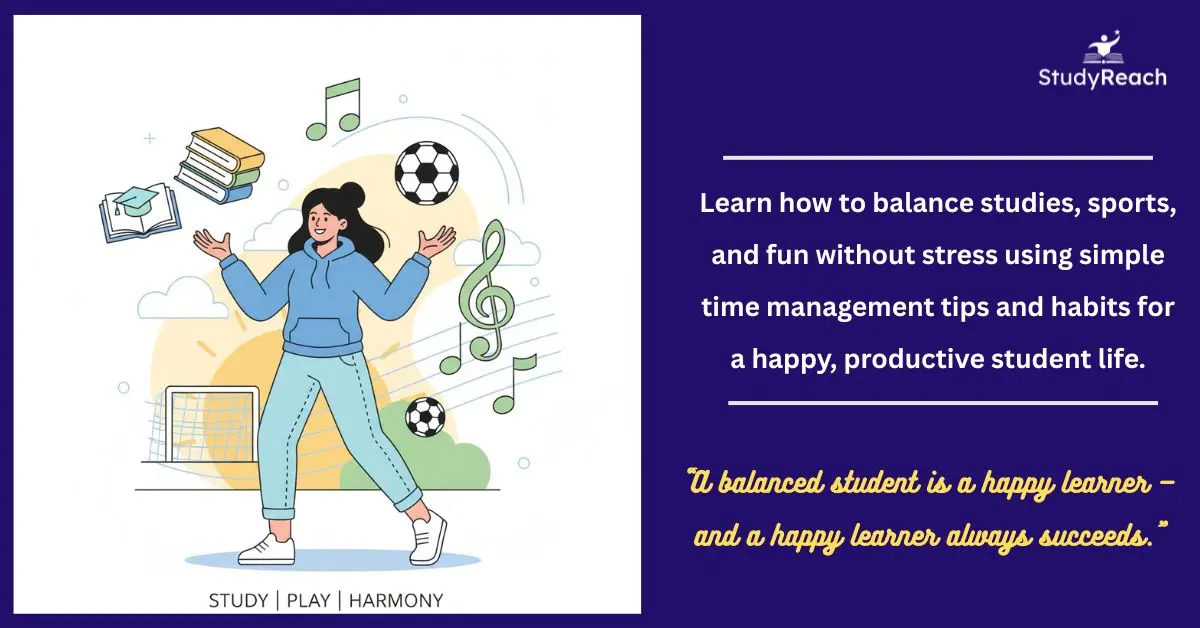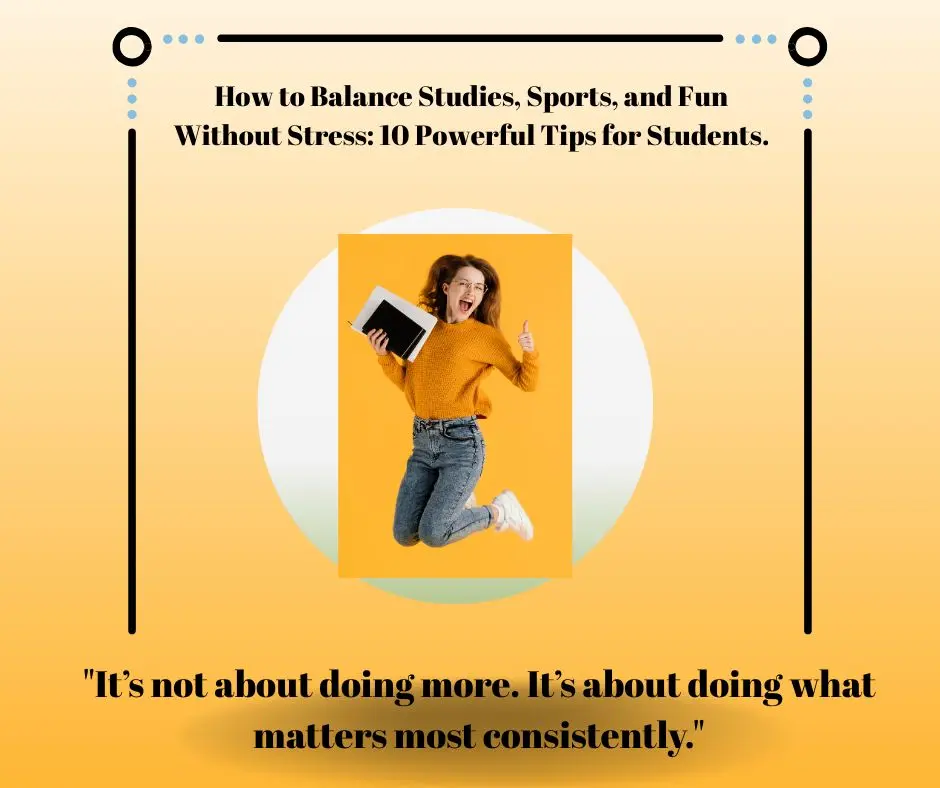How to Balance Studies, Sports, and Fun Without Stress: 10 Powerful Tips for Students

How-to-balance-studies-sports-and-fun :
Student life is full of challenges — exams, projects, deadlines, and competitions. But life isn’t just about grades. It’s about growth, happiness, and learning new skills. Balancing studies, sports, and fun helps students stay motivated, stress-free, and healthy. Let’s explore how you can achieve this balance with smart habits and simple strategies.
Table of Contents
Understanding the Real Meaning of Balance
Balance doesn’t mean giving equal time to everything. It means knowing what matters most right now and adjusting your time accordingly. Sometimes you’ll study more before exams, and other times, you’ll need to play or rest more. True balance is flexible and keeps you mentally fresh and physically active.
The Importance of Balance in Student Life
Why Students Struggle with Time Management
Most students feel overwhelmed because they don’t plan their day properly.
Common mistakes include:
- Studying without breaks
- Ignoring physical activities
- Spending too much time on screens
- Fearing they’ll “waste time” if they relax
Remember — even the most successful students need rest and recreation.
The Role of Sports and Fun in Academic Success
Sports and fun aren’t distractions — they’re essential for growth.
According to education experts, students who play sports regularly show:
- Better focus and memory
- Improved teamwork and leadership skills
- Higher self-confidence
- Stronger discipline
So, the next time you play football or dance with friends, remember — you’re not wasting time; you’re building character.
Benefits of a Balanced Lifestyle for Students
Here’s how a balanced life helps you in the long run:
| Aspect | Benefits |
| Studies | Improved concentration and better results |
| Sports | Fitness, confidence, and team spirit |
| Fun | Stress relief, creativity, and happiness |
| Sleep | Mental freshness and emotional stability |
Smart Study Habits for Busy Students
Plan Your Study Schedule Like a Pro
Start each week by planning your major tasks. Use a study planner or a simple notebook.
✅ Pro Tip: Plan your study hours around your most energetic time of the day.
Morning people should study early, while night owls can study after dinner.
Example:
- 6–8 AM – Study
- 8–9 AM – Breakfast and prep
- 5–6 PM – Sports or physical activity
- 8–10 PM – Study or revise
Use the 45-15 Rule for Better Focus
Studying for long hours without breaks makes your brain tired. Try the 45-15 Rule — study for 45 minutes, then take a 15-minute break.
During your break, do something relaxing:
- Stretch or walk
- Drink water
- Listen to music
- Talk to a friend
You’ll be amazed at how much more productive you become!
How to Avoid Last-Minute Study Stress
Procrastination is the real stress creator. Follow these habits:
- Start small — one chapter a day.
- Revise weekly instead of cramming before exams.
- Avoid multitasking; focus on one subject at a time.
“It’s not about doing more. It’s about doing what matters most consistently.”
Making Time for Sports and Fitness
Why Every Student Should Play a Sport
Sports are not just for athletes. They build stamina, focus, and leadership. Even 30 minutes of physical activity daily can boost your energy and improve your mood.
Try these:
- Running or jogging
- Football or badminton
- Yoga or cycling
Choose what you love — consistency matters more than performance.
Simple Ways to Fit Sports into Your Daily Routine
- Walk or cycle to nearby places instead of using vehicles.
- Join a weekend sports club or fitness challenge.
- Use school sports periods actively.
- Play outdoor games with friends instead of video games.
Even small actions make a big difference.
The Mind-Body Connection: How Sports Improve Learning
When your body is active, your brain releases endorphins — natural happiness hormones.
These chemicals:
- Boost memory
- Reduce anxiety
- Improve creativity
That’s why students who exercise regularly perform better academically.

Don’t Forget the Fun!
Why Fun Is Not a Waste of Time
Fun is food for the soul! Whether it’s watching a movie, drawing, or hanging out with friends, fun helps your mind recharge.
Remember, you can’t pour from an empty cup — relaxation is essential for productivity.
Fun Activities That Recharge Your Mind
Here are some stress-busting activities:
- Painting or doodling
- Playing a musical instrument
- Cooking or gardening
- Spending time with family
- Reading inspirational books
Choose activities that make you happy, not just entertained.
Balancing Screen Time and Real Fun
Today’s biggest challenge? Screens!
Too much time on social media reduces focus and increases anxiety.
✅ Limit recreational screen time to 1 hour a day.
✅ Replace scrolling with real-world fun — games, art, or talking to loved ones.
The Perfect Balance Formula
Here’s an example of a balanced weekly schedule:
| Activity | Hours per Week | Purpose |
| Studies | 35 | Academic growth |
| Sports | 10 | Physical fitness |
| Fun & Hobbies | 7 | Mental relaxation |
| Sleep | 49 | Recovery & focus |
| Family & Social Time | 7 | Emotional health |
Balance isn’t about perfection — it’s about priority.
Tips to Stay Consistent Without Feeling Burnt Out
- Set small goals: One subject or topic at a time.
- Take short breaks: Never study for more than 2 hours straight.
- Celebrate progress: Reward yourself for small achievements.
- Stay positive: Don’t compare your journey with others.
How Parents and Teachers Can Support Balance
- Encourage children to enjoy sports and hobbies.
- Avoid pressuring them for perfect grades.
- Teach time management and healthy discipline.
- Recognize achievements beyond academics.
A supportive environment helps students thrive both mentally and emotionally.

The Inspiring Story of a Student Who Beat All Odds to Succeed | 7 Lessons to Learn.
Related Blog Article : Balancing Sports and Studies: The Vidyashram Way to All-Round Success
Conclusion:
Balance is a Skill, Not a Miracle
Balancing studies, sports, and fun isn’t about luck — it’s about habits.
Start small, stay consistent, and remember:
“A balanced student is a happy learner — and a happy learner always succeeds.”
1. How can I manage studies and sports together effectively?
Create a fixed schedule that includes both. Prioritize academics during exams and sports during holidays.
2. What if I feel guilty while having fun instead of studying?
Don’t! Fun helps you recharge and perform better later. Think of it as brain fuel.
3. Can sports actually improve my grades?
Yes! Sports improve focus, discipline, and memory — all key for better academic performance.
4. How many hours should I study daily?
It depends on your class and goals. Usually, 3–4 focused hours daily are enough with proper planning.
5. What’s the best way to stay stress-free during exams?
Sleep well, revise early, eat healthy, and stay physically active.
Please don’t forget to leave a review.
Explore more by joining me on www. Studyreach.in
















1 Comment
Oh my goodness! an amazing article dude. Thanks However I am experiencing concern with ur rss . Don’t know why Unable to subscribe to it. Is there anybody getting similar rss problem? Anybody who knows kindly respond. Thnkx